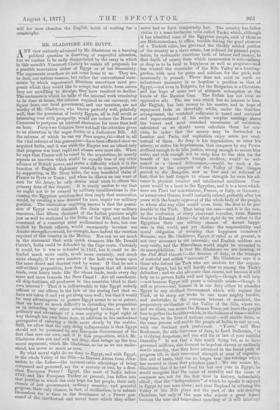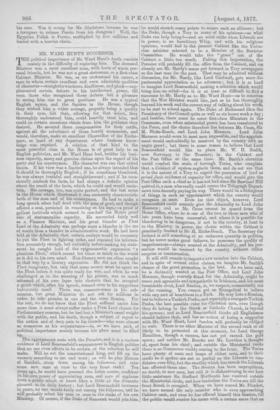MR. GLADSTONE AND EGYPT.
ANY view seriously advanced by Mr. Gladstone on a burning political question is deserving of respectful attention, but we confess to be sadly disappointed by the essay in which in this month's Nineteenth Centurg he resists all proposals for a possible annexation either of Egypt or of her Suzerainty. The arguments somehow do not come home to us. They are, in fact, not serious reasons, but rather the conventional state- ments by which experienced Ministers sometimes meet pro- posals which they would like to accept:, but which, from causes they are unwilling to divulge, they have resolved to decline. The sentences in which he talks of the internal work remaining to be done at home, the reforms required in our currency, our liquor laws our local government, and our taxation, are not worthy of NIr. Gladstone, who knows perfectly well, painfully well, that the possession of twenty Egypts, all in full revolt or brimming over with prosperity, would not induce the House of Commons to postpone an internal discussion for more than half an hour. Forty-two Colonies have not half the attention given to an alteration in the sugar duties or a Judicature Bill. All the reforms of which he can say Pars myna fai—that is, all the vital reforms of this generation—have been effected since we acquired India, and it was while the Empire was an island only that progress was least rapid and abuses were most rife. When he says that France will be vexed by the acquisition, he merely repeats an assertion which would be equally true of any other advance of British power, and states a difficulty which it is the function of English diplomacy carefully to remove, probably by supporting, as Mr. Dicey hints, the very beneficial claim of France to Syria or Tunis ; and when he dilates on our want of men for the Army, he only denies what seem to others the primary data of the dispute. It is surely useless to say that we ought not to be swayed by military considerations in dis- cussing the Egyptian question, md then imply that annexation would, by creating a new demand for men, impair our military position. The contention requiring answer is that the posses- sion of Egypt would diminish the drain upon our military resources, that fifteen thousand of the Indian garrison might just as well be stationed in the Delta of the Nile, and that the command of a conscript army acclimatised to Asia, but con- trolled by British officers would enormously increase our Asiatic strength,.—would, for example, have halved the exertion required of this country in the Mutiny. Nor can we see much in the statement that with quick steamers like Mr. Donald Currie's, India could be defended by the Cape route. Certainly it could, for it was so defended in 1857, but it could be de- fended much more easily, much more certainly, and much more cheaply, if we were masters of the half-way house upon the most direct and shortest road by water. If that be not a self-evident proposition, how does it happen that all Asiatic trade, even heavy trade like the wheat trade tends every day more and more towards the Suez Canal ire all merchants. all ship-builders, all producers in two countries blind to their own interest ? That it is indispensable to take Egypt nobody affirms or can affirm, in the face of the staring fact that we have not taken it and yet get along very well ; but that it would be very advantageous to possess Egypt seems to us so patent, that we have as much difficulty in defending the proposition as in defending any other acknowledged truism, or the ex- pediency and advantage of a man enjoying a legal right of way through his own front door, in addition to his undoubted prerogative of entering a little more slowly by the stables. Still, we allow that the only thing indispensable is that Egypt should not be possessed by any European Government of the first class save our own, and it is this proposition, which Mr. Gladstone does not and will not deny, that brings up the true moral argument, which Mr. Gladstone, so far as we can under- stand, has never so much as seen.
By what moral right do we deny to Egypt, and with Egypt,
to the whole Valley of the Nile—to Eastern Africa from Alex- andria to the Lakes—the inconceivable advantage of being conquered and governed, say for a century or two, by a first- class European Power ? Egypt, like most of India before 1757, and like European Turkey at present has fallen into that position in which the only hope for her people, their only chance of just government, ordinary security, and peaceful progress, their only chance, in fact, of civilisation, is to submit themselves for a time to the dominance of a Power pos- sessed of the intellectual and moral force which they either never had or have temporarily lost. The country has fallen victim to a semi-barbarous tribe called Turks, which, although it has admitted some of the Egyptian people, such of them as are Mahommedans, to office, tenable during the good pleasure of a Turkish ruler, has governed the thickly settled portion of the country as a slave estate, has reduced its peasant popu- lation, by systematic exactions both of labour and money, to that depth of misery from which resurrection is not—misery so deep as to be fatal to happiness as well as progress—and has treated the remainder, of the Nile Valley is a hunting- garden, with men for game and soldiers for the pack, sent incessantly in pursuit. There does not exist on earth an industrious peasantry in so hopeless a position as that of Egypt,—not even in Bulgaria, for the Bulgarian is a Christian, and has hope of some sort of ultimate redemption at the hands of the Russian Czar. The Fellah has not even an oppressive ally. The one race which has an interest in him, the English, has lent money to his master, and in hope of repayment looks on cheerfully while, under the Goschen arrangement, the wretched. cultivator is taxed and surtaxed and super-surtaxed of his entire surplus earnings above the barest and most wretched necessaries of existence, calculated as we should never calculate them for con- victs, in order that the money may be forwarded to London and Paris, and capitalists enjoy seven per cent. instead of three. So deep is his degradation, so utter his misery, so entire his hopelessness, that conquest by any Power civilised enough to do him justice, strong enough to secure him order, and rich enough not to strip him to the skin for the benefit of his master's foreign creditor, would be wel- comed as a blessed deliverance,—would be such a de- liverance as the conquest of the Valley of the Ganges proved to the Bengalee, now so free and so relieved of fear, that he half forgets to whose strength he owes his ad- vance in physical comfort and intellectual manliness. Con- quest would be a boon to the Egyptian, and it is a boon which, were our Fleet but non-existent, France, or Italy, or Germany, or a renovated Greece, would instantly extend, probably after ten years with the hearty approval of the whole body of the people, to whom also any ruler would seem from the first to be pre- ferable to the Turk. That being the case—and it is the ease, by the confession of every observant traveller, from Nassau Senior to Edmond About—by what right do we refuse to the Egyptians their one solitary chance of decent happi- ness in this world, and yet decline the responsibility and moral obligation of securing that happiness ourselves ? Because, says Mr. Gladstone, Egypt, if ruled as at present, is not very necessary to our interests ; and English soldiers are very costly, and the Mussulman world might be wounded in its susceptibilities. Is that Mr. Gladstone we are hearing, or the Pall Mall Gazette :P—the devotee of duty, or the trumpet of material and selfish "interests ?" Mr. Gladstone says it is those who defend the Turk who are anxious for the acquisi- tion of Egypt, but he will hardly class us among the Turk's defenders ; and we also advocate that course, not because it will help us to govern India well and lightly—though it will help —not because Egypt will prove a valuable estate—though it will so prove—but because it is our duty either to abandon Egypt to any civilised Government which will replace the Turk, or to stoop our necks to one more mighty burden, and undertake, in the common interest of mankind, the preparatory civilisation of the Valley of the Nile, where we, and we alone, can secure the Roman Peace, yet leave the people free to gather the faculties which, in the fullness of time—and no long time, as the lives of nations count—will enable them, as the same process will enable the people of India, to cast us out, with our destined work performed. "Yours," said Herr Rochussen, the able Governor of Java, to Lord Dalhousie, "is
you will die at last of your suicidal a vivifying despotism, and liberality." Is not that a fate worth dying for, so to have governed millions, else doomed to hopeless slavery or endlessly sterile anarchy, that they have advanced in the broad path of progress till, in their renovated strength at once of organisa- tion and of brain, they can no longer bear the tutelage which has secured to them that priceless gain ? We can assure Mr. Gladstone that if he had lived for but one year in Egypt, he would recognise that the cause of morality and the cause of conquest are, not for the first time in history, indissolubly allied; that the " independence " of which he speaks is enjoyed in Egypt by one man alone ; and that England in refusing the Valley of the Nile plays not the part of the self-denying Christian, but only of the man who rejects a great legacy because the wise and benevolent spending of it will interrupt his ease. Was it wrong for Mr. Gladstone because he was a foreigner to release Poerio from his dungeon ? Well, the Egyptian Fellah is Poerio, multiplied by five millions and loaded with a heavier chain.



































 Previous page
Previous page